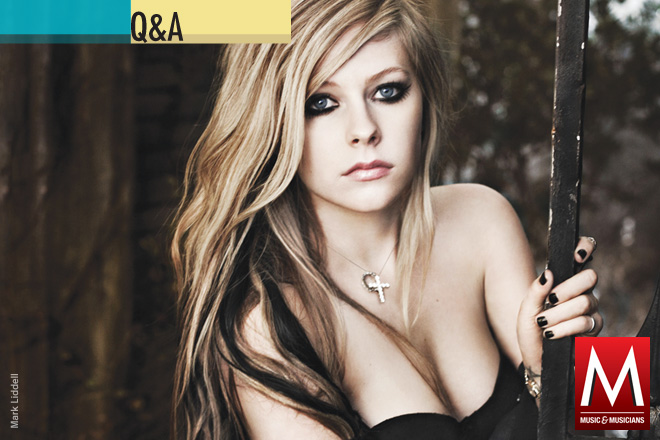
AVRIL LAVIGNE
A pop princess strips down her sound—and fights for her vision
Goodbye Lullaby is Avril Lavigne’s first new album in four years—and her most emotional effort yet. “It’s not like I haven’t gone there before,” says Lavigne, who has sold more than 10 million albums since releasing her debut, 2002’s Let Go, at age 17. “I’ve done that on some of my albums, but I was really in that place and wanted to go more in that direction.” Ontario native Lavigne has always had a hand in writing her songs, including hits like “Complicated,” “Girlfriend” and “My Happy Ending”—but she goes one better on the stripped-down new record, writing half the tunes on her own.
This album is your most acoustic-based yet. How did that develop?
I’ve always enjoyed doing acoustic performances. When I would do that with my previous songs that have fuller pop production, like “Girlfriend” or “Sk8ter Boi,” I would end up singing them differently when they were stripped down. I like how that feels, so I wanted to make an album that was more about acoustic guitars and the vocal performance. You can do a good vocal take with a lot of these pop tracks, but the producer puts a lot of compression on it, and the character and tone can get hidden. I want people to hear the emotion.
What emotional vibe did you want?
The main emotion is bittersweet, a blend of happy and sad. The overall message is about life and its journey, moving forward and finding inner strength, being strong and getting through things. The album has a positive message, though. It’s not negative at all.
What inspires you lyrically?
So much of it is from my life. I write about things I see my friends or family go through, things people in general go through. And then a lot of it is me. Actually it’s mostly me.
Why did you write alone this time?
I’ve written songs on my own before, I just hadn’t put them on my records. For instance, I have a song called “Darlin” that I wrote when I was 14 and put it on this album. I typically write on guitar but I wrote a lot of the songs on the piano at my house or on the road. I’d been playing a lot of piano on tour. But the overall process of this record was different. I worked in my home studio for the majority of recording, and took more time than I had on any of my other albums.
How long did recording take?
I worked on this album for about two years, so I’ve actually been done for quite a while. There were a couple of different release dates planned, but they didn’t happen. I ran into a little fighting with the record company, because sometimes they come along with their vision. I said, “Um, hi, I have my vision, this is my life, my record and these are my songs. It’s my name, and you can’t tell me what to do. Do you write my songs? No, so you can’t tell me how to do this.”
Can you relate to the songs on Let Go when you sing them now?
I connect with them. I love them. I love to play them, and it’s nice to go back to them. I’ve always put a lot of myself into my music, so it represents me, it was part of me—and it still is. I’ve had this consistent message, without even saying it, of being a strong person and standing up for myself.
–Eric R. Danton



comment closed